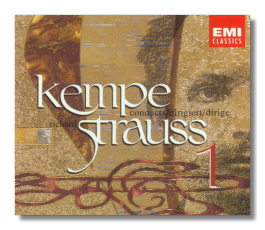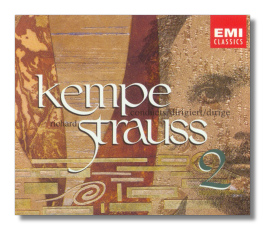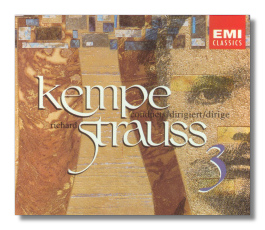
The Internet's Premier Classical Music Source
Related Links
- R. Strauss Reviews
- Latest Reviews
- More Reviews
-
By Composer
-
Collections
DVD & Blu-ray
Books
Concert Reviews
Articles/Interviews
Software
Audio
Search Amazon
Recommended Links
Site News
 CD Review
CD Review
Richard Strauss

Complete Orchestral Works 1
- Horn Concertos #1 & 2
- Oboe Concerto
- Duet Concertino
- Burleske
- Parergon zur Sinfonia Domestica
- Panathenaenzug
- Till Eulenspiegel's Merry Pranks
- Don Juan
- Ein Heldenleben
Peter Damm, horn
Manfred Clement, oboe
Manfred Weise, clarinet
Wolfgang Liebscher, bassoon
Malcolm Frager, piano (in Burleske)
Peter Rosel, piano
Peter Mirring, violin
Rudolf Kempe/Dresden Staatskapelle
EMI 64342 - 224min


Complete Orchestral Works 2
- Violin Concerto
- Sinfonia Domestica
- Also sprach Zarathustra
- Death and Transfiguration
- Der Rosenkavalier Waltzes
- Dance of the Seven Veils from Salome
- Le Bourgeois Gentilhomme Suite
- Schlagobers Waltz
- Josephslegende Symphonic Fragment
Ulf Hoelscher, violin
Rudolf Kempe/Dresden Staatskapelle
EMI 64346 - 223min


Complete Orchestral Works 3
- Metamorphosen
- Alpine Symphony
- Aus Italien
- Macbeth
- Don Quixote
- Dance Suite from Pieces by Couperin
Paul Tortelier, cello; Max Rostal, viola
Rudolf Kempe/Dresden Staatskapelle
EMI 64350 - 208min
Rudolf Kempe, who died in 1976 at the age of 65, was one of the most powerful, persuasive, and inventive interpreters of the music of Richard Strauss. In the early 1970s with the Dresden State Orchestra he made a series of critically-acclaimed recordings of the major Strauss orchestral scores. Now EMI has made these performances available once again on three sets of three discs each, all at a bargain price.
Volume I consists primarily of concerted works (only the Violin Concerto was saved for Volume II), beginning with the two irrepressible Horn Concertos. While soloist Peter Damm may lack the authority and full-blooded sound of Dennis Brain, he does give thoroughly idiomatic and engaging performances which are superior in every way to either the LP or CD versions by Barry Tuckwell. Damm's lovely tone frequently reminded me of a cello and, at times, even the human voice. Kempe responds to Damm's intimate, songful approach with a delicate, chamber-like accompaniment. By contrast, Manfred Clement's tone in the late Oboe Concerto is nasal and irritating in the worst mid-European tradition, but Kempe gives us a finale which is so sweetly playful that I hardly noticed. Conductor, soloists, and orchestra are at their absolute best in the Duet-Concertino, which has rarely seemed more tender or charming. The melodies are spun with charm and grace, while Strauss's magical scoring is heard to stunning effect.
The three piano and orchestra works are also given top-notch readings. Frager and Kempe dispatch the shifting moods, colors, and tempos of the Burleske with great care, charm, and ease. Overall, their recording is both more focussed and more alert than the widely-acclaimed Janis/Reiner from RCA. The two scores that Strauss composed for Paul Wittgenstein (the pianist who tragically lost his right arm in World War I) ought to be far better known. The Parergon (or "addendum") to the Sinfonia Domestica tells the autobiographical tale of parents worried by their child's serious illness – namely typhoid. The work begins in darkness and despair, but soon the sun breaks through, leading to a joyous and optimistic conclusion. Less familiar – and vastly more interesting – is the all but unpronounceable Panathenaenzug, which describes in musical terms the atmosphere surrounding the ancient festival in honor of the goddess Athene. It's a light-hearted and witty score, abounding in felicitous touches – such as the colorful duet for piano and celeste at approximately 15 minutes into the work. The solo parts in both scores are fiendishly difficult, but Peter Rosel dashes them off with ease and grace. One wonders why Rosel has not been recorded more frequently and why these two delightful compositions languish in such unjustifiable obscurity.
Kempe's Don Juan reveals all of the characteristics that will mark the orchestral performances included in this excellent collection: the incredible lightness of touch, crystal clarity of the instrumental textures, brisk tempos, and infectious enthusiasm for the music. Kempe maintains a tremendous level of energy in a recording which reminds me very strongly of Serge Koussevitzky's classic version. Till Eulenspiegel is a lively and light-footed romp characterized by crisp, sharp attacks and brilliant playing from the Dresdeners. And Kempe never once loses the sense of forward motion – even in the score's more relaxed episodes. It's as if the prankster in Till is always present, if just beneath the (seemingly) calm surface.
In the American Record Guide's Strauss Overview (March/April 1990), editor Don Vroon had this to say about Kempe's Heldenleben: "Nothing in the current catalog comes near it for blood-stirring heroism and elan. It never lets up; it's a taut edge-of-your-seat performance." Funny, but I find Kempe far too relaxed and uninvolved here. Even his battle music is understated; it seems more like a disagreement among gentlemen than a bloody war. By contrast, Karajan (also on EMI, but not currently listed in Op. ) offers intensity, drama, and, in the case of the hero's wife, powerful sexuality. Karajan's critics drip with venom (Kempe's are merely pompous), and the hero is obviously stung by their barbs. No other conductor has captured the horrors of the battle as effectively, and the serenity that Karajan achieves in the work's closing moments is also unsurpassed. Both orchestras play splendidly, but the silken Berlin strings give Karajan a slight edge in this department as well.
Volume II leads off with the beautiful and vastly underrated Violin Concerto (Op. lists only one other recording, with soloist Xue-Wei on AS&V). Play this work for your friends, and see if they can identify the composer. The only hint of Strauss I can detect is in the heroic horn calls toward the end of I. Despite a lack of personality, this delightful score has much to recommend it – from virtuoso fireworks to tender, lyrical episodes. Alas, soloist Hoelscher is barely up to its demands. He's clumsy, scratchy, and ineloquent. As with so many of EMI's concerto recordings from this period, the soloist is much too far forward while the orchestra is distant; mysteriously the ensemble moves even further off for the rondo finale. If only the perspective had been reversed here – a bit of distance might have helped to mellow Hoelscher's strident tone.
Whatever reservations I may have concerning the Concerto, Kempe's Sinfonia Domestica cannot be recommended highly enough. The ARG overview had great praise for Gerard Schwarz's Delos recording, but I find him heavy, ponderous, and world-weary. Kempe, on the other hand, is genial and warm while his pace is lively. Like Karajan, Kempe takes 44 minutes with this score; Schwarz languishes for 48. Indeed, Kempe reminds me very strongly of Karajan here, except that Kempe is even better, and the ravishing Dresden Orchestra outplays their Berlin counterparts by a hair. The sound is the best in the collection: rich, warm, finely detailed, yet spacious.
Kempe makes Zarathustra into a sensuous feast characterized by kaleidoscopic orchestral colors and an enormously wide dynamic range. The Dresden strings really outdo themselves here – rich and mellow in the "Underworld" section, powerful and dramatic in "Of the Great Yearning", and searingly beautiful in "Of Joys and Passions". Equally remarkable is Kempe's unerring sense of drama and his ability to build and sustain a mood. From the brilliant sunrise opening to the mystical and hushed conclusion, this performance grabs your attention immediately and never once lets it go. On records, only Reiner and Koussevitzky have equalled this performance – and all three belong in your collection. Kempe's Death and Transfiguration packs a tremendous wallop – both literally and interpretively. The presence and power of timpani strokes may knock you right out of your chair, as will the drama and urgency of this performance. Still, much as I admire Kempe here, I find even more insight in George Szell's classic CBS disc, which also includes sublime versions of Till Eulenspiegel and Don Juan. My only complaint about Kempe's Rosenkavalier Waltzes is that his 18 minute Suite is far too short. He brings a Mozartean elegance and grace to this music which leaves me wanting much more.
The Dance of the Seven Veils is by far the most prurient and seductive performance I've yet heard – it should be clearly labeled, "Warning: Contains sexually explicit orchestral playing. Parental guidance advised!" If Kempe's Rosenkavalier Waltzes evoke Mozart, his glorious Bourgeois Gentilhomme Suite conjures up the shades of Lully and Couperin, as viewed from Strauss's perspective in the early 20th century. Kempe easily straddles both the ancient and modern worlds, and his orchestra turns in an alert, graceful, and witty performance. Conductor and orchestra must have had great fun making this thoroughly enjoyable recording. The sound is close up and lacking warmth, but in this instance the music does benefit from the extraordinary clarity. The light and creamy reading of the Schlagobers Waltz makes me wish Kempe had recorded the entire ballet. On the other hand, we get more than our share of the Josephslegende ballet. Still, it's almost worth it to hear the Suite's charming and deftly scored middle section. If only Kempe had dispensed with the pompous opening and the bland finale.
Volume III begins with the Metamorphosen, in a claustrophobic recording that results in a wiry string sound. Nonetheless, Kempe's performance is colorful and aptly paced. As in Zarathustra, this conductor's uncanny ability to build and sustain moods helps him mold a powerful reading of the Alpensinfonie. And the Dresden Orchestra gives a lovely, dramatic, sensuous, and stirring performance of this much-malaigned work. Here EMI's finely detailed, but rich and well blended sound is ideal for this complex score. From the swagger of the ascent to the brilliant and blazing climax at the summit, this is one of the finest Strauss discs ever made.
Kempe very nearly makes a convincing case for Aus Italien, in which he's aided and abetted by the glowing Dresden strings and the rich, velvety recording. Despite the magnificent playing, expert interpretation, and glorious sound, Macbeth stubbornly refuses to come to life. This massive, sprawling canvas belongs more to Hollywood than Birnam wood. Still, the quiet, reflective moments do have occasional charms.
The Kempe/Tortelier Don Quixote is easily the best recording available today. With Karajan/Rostropovich currently out of print, no other version comes close to equalling this affectionate and richly complex portrayal of Cervantes' hero. Kempe's Quixote begins as a cocky, know-it-all. But soon his bravery, compassion, dignity, and humor come to the fore. When his tortured mind gives way following his defeat, Kempe makes his horror and misery nearly unbearable. And Quixote's death, though inevitable, brings both tears and (in the coda) the sense that a bit of the great man's spirit lives on in all of us. Tortelier's cello is too close up here, but his magnificent playing and Kempe's endlessly inventive interpretation are so dazzling that I can't really complain. Volume III concludes with a delicate and colorful performance of the little-known Dance Suite after Couperin. It's hardly top-drawer Strauss, but it does have its moments – such as the enchanting duet for xylophone and harpsichord in III. Kempe turns in a typically lively performance.
The notes by Ernst Krause – in English, German and French – are well written and concern themselves primarily with the origin and a brief discussion of each work. The same anonymous and overwrought "appreciation" of Kempe ("He was the bearer of a great tradition but never a conductor who attempted to storm the heights with sound effects made for their own sake…"; it sounds more impressive in German, at least) is appended at the end of the booklet in each volume. Given the dearth of information in English about Herr Kempe, it's a shame that EMI didn't use the space to provide us with more detailed and useful biographical information.
With an array of performances as fine as these – most of which are simply the best available – Strauss devotees will need no further incentive to purchase all three volumes. On the other hand, if you're just beginning to explore the wonders of the Strauss orchestral repertory, there can be no better introduction than this. For those on a truly tight budget, start with Volume II, but don't wait too long to acquire the remaining discs Given the tragic example of their recent history, there's no telling how long EMI will allow these matchless performances to remain in their catalog.
Copyright © 1995, Thomas Godell.
This review originally appeared in the American Record Guide


















